Seminar on Law of Karma | HH Bhanu Swami Maharaj | ISKCON Sydney, May 9, 2025 !
At the beginning of Bhagavad Gita, in the introduction Prabhupada mentions there are five topics of scripture in general. One of course is Supreme Lord, another is the Jiva, another is material energy, another is time and another is karma. So in the Bhagavad Gita we have a lot of discussion of Supreme Lord and Jiva and material energy, not so much about time except we have the universal form who is non-different from time. And we have a little bit of a discussion of karma, but not too much. So nevertheless in Bhagavatam, we get a little more details on the law of karma.
Okay, so of course karma has a general meaning which means action, to do anything is karma. But we have a more particular meaning, one is karma, like in karma yoga, karma means your prescribed activities or your rituals that you do. So we have things called Nitya karmas that you’re supposed to do every day like Sandhya vandana, Pancha Maha yagya and whatever. That’s another meaning of karma, more specific. The other meaning of karma of course is when we do activities, we get not only result in this lifetime, we also get results in next lifetime or next lifetime. So that’s the when we use the word karma that’s what we’re using now. So people use this word a lot, not only in India, but even in the Western world. People talk about it’s your karma etc. But there’s a little bit of a misunderstanding about the use of this word.
So usually karma means predestiny or fate. So everything is fated for us and we’re helpless in the material world, because karma is affecting us. So when we have such an idea that excludes the idea that we have any free will or a possibility of changing anything. So this of course is wrong [Laughs]. So we do have karma, but we also have free will and choice as a human being. So as I said, this karma is something which extends over lifetimes. It’s a reaction to our actions that we do in one lifetime. And it makes, it determines certain fixed events of our life and whether we do anything or not we get that effect such as an accident, a sickness or even our death. Our death is a karma. We have a certain lifespan. So we do a lot of sinful activities, you have a short lifespan. If you do a lot of pious activities you have a long lifespan. So that length of life is your karma. And then within that you have many events which are predetermined by the law of karma.
So the events is one thing. Along with the events, we have impressions. So we carry over the impressions that we have in each lifetime. We do actions and then we have an impression. This is very good. This is very bad. I don’t like this. I’m afraid of this or whatever. We have very strong likes and dislikes or whatever as a result of our actions. This can also carry over into your next lifetime. So it’s not actually an event or anything. It’s just say your personality or your likes and dislikes of this lifetime determined by past lifetimes. So we get these two things. This is what we call the vasanas, the impressions that carry over. And so that’s a little bit distinct from the actual events that happen to you. But both are there. So they continue life after life after life.
When we experience a karma we get the result. Let’s say we get an accident that was a karma from five lifetimes ago. Generally that should finish that karma. So we don’t have to deal with that anymore. Sometimes of course we do a sinful activity and we may get effects for several lifetimes. Very sinful activity. We may get a karma that lasts for 20 lifetimes or 30 lifetimes. So with every lifetime we’re going to get some problem, because of one action we did in one lifetime. And the effects carry over for many lifetimes. So it’s very difficult for us to predict all of this. Which event is going to give how many lives of karma etc. But in general, by experiencing we wear off the karma.
The vasanas on the other hand are changeable in every lifetime, because we can get new impressions to replace old impressions. So we get new likes or new dislikes. Sometimes of course, it may be difficult to change. So we’re born with certain desires, certain attractions and we can’t get rid of that our whole lifetime [Laughs]. And it may continue for many lifetimes. But sometimes in the middle of life, we could change something. And we don’t like something anymore. We get rid of that and we get a new like. So the vasanas are changeable within this lifetime. So in any case, both of these things continue life after life after life.
And this pushes us into new bodies. The bodies themselves are a result of karma. And this is described in Bhagavatam, Bhagavad Gita and other literatures. You do a lot of sinful activities, you become an animal or a plant. You do mixture of activities you stay as a human being. You do lots of pious activities or punyas, you go to Svargaloka, become a devata or whatever. In any case, we end up with material bodies. Good or bad or whatever like that. And this continues and continues and continues. So in the introduction of Bhagavad Gita, Prabhupada explains that we have these five factors and you know Jiva and prakriti and supreme Lord, time and we have karma. So, karma is without a beginning. Can have an end, but may not have an end also [Laughs]. So for most people, it’s been going on forever and ever and ever so we make it into a circle. Circle has no beginning and end. So in this way you take birth after birth after birth after birth and you can’t trace out when the first one started. So it looks like endless. So circle is endless. So we have the wheel of karma.

This is a Buddhist depiction of the wheel of karma here with the big monster up top. The big monster is time. So everything is under the rule of time. And so we get born again and again in the material world and different bodies. In this diagram we have six divisions. Of course we get more divisions because of many different types of lifetimes. But we have the different division series. So you could be ghostly body, heavenly body, hellish body, deva body, human body, animal body, etc. Like this. These are the options. Not in particularly this order. But we rotate among different species of life according to our activities as a human being.
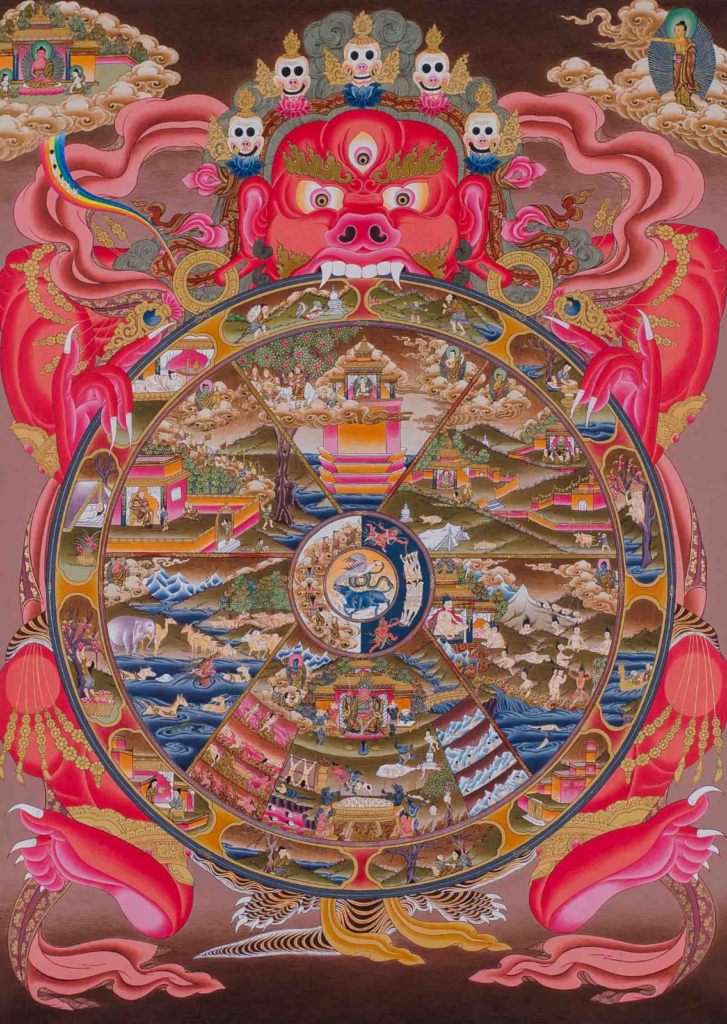
In the middle we have three animals here. This is there’s a snake, a pig, and a chicken. So this ofcourse is symbolic. Lust, anger, and greed. So lust, anger, and greed propels the human being into action. And then the action creates karma. So this helps the wheel of karma rotate. So we get body after body. Body because of our uncontrolled mind where we display lust, anger, and greed. And we do all sorts of sinful activities. So this is the generator that turns the wheel around – Lust, anger, and greed !

Yeah. And of course top we got the mind as the controller. So we get birth after birth after birth. And the birth is determined by previous actions. Like that. This is a simplified diagram of that. So of course even among the human beings, you could take birth among different human beings. In Tamas, Raja, Sata, etc. You could be born in different countries due to karma. You can be born in a rich family, poor family, etc. You can be born in the Arctic, an Eskimo, can be born as an aborigine on the Andaman Islands or whatever. This is human life. So among each of these divisions there’s so many possibilities for your karma.
So how does the law of karma work? It’s a law. And countries have laws. Those laws are made by the government [Laughs]. And they determine, okay, this is a law. You have to follow it. If you don’t follow it, you get a punishment. So the law of karma operates like that. But it’s a little more complete. So how does it work? There’s many details. But the general principle is, it acts for the human being. If you’re an animal and your dog bites you, the dog does not get any karma. If the tiger eats you up, it doesn’t get any karma [Laughs]. If the snake bites you, it does not get any karma. No reaction. They dis-expend karma of being a snake or a dog or a tiger from the previous karma. But they don’t accrue karma by their actions. But human beings accrue karma. They get results for all their actions. So the general principle is, if we interfere with other living entities and unnecessarily cause violence, we get a bad karma. And we have to suffer for that.
And we have another rule. If you do good activities for other living entities, you get good results, good karma. So it’s not one way. Laws of the country, you follow them, nothing happens to you. And if you break the law, you go to jail. But if you don’t get any rewards also, for following the law, you don’t get any rewards. But in this law, if you do certain activities, you get rewards also. That is, you do punya or pious activity, you get good results, good karma. So this way, the law of karma is very just.
Another fact, of course, is that it’s unwritten. Laws of the country, you can look in the constitution or whatever, in the law books, and you’ll find all the laws. These laws are not written there. Of course, they’re written in the scriptures. But not everybody looks in the scriptures [Laughs].
But the laws will apply to everybody in every country. Even if it’s not in your country laws, these laws will apply. So in addition to the laws of the country, we have the laws of karma, which are going to operate also. Sometimes they overlap. And if the country catches you for a crime and punishes you, then the law of karma doesn’t have to act for that. But if the country doesn’t catch you and put you in jail for your crime, law of karma is going to act. It’s going to give the punishment. So very just law. So nobody can escape the law. Government law, you can escape sometimes [Laughs]. People are clever, they can hide their crime, whatever like that, nobody detects it, or whatever. And even if they get detected, they have some means, they get light sentence or whatever, like that. So there’s ways of manipulating in the material world. No manipulation here. Yamaraj won’t listen. You can’t bribe Yamaraj. So you get an inevitable result, it must come to you.
So the acts of violence, of course, are inherent in living. To live, we have to kill something and harm something. And we have to walk, we have to do activities. In the meantime, we’re killing bugs and whatever you light a fire, you’re killing some flies or moths or something. You roll your chapati, you kill an insect or whatever. You sweep the floor, you harm an insect or whatever. So this regular activities are going to cause violence, unnecessary violence in one sense. It’s a little bit forgivable, we get little karma for that, not so much. But nevertheless, we get some result. But where there is higher forms of life, we get more karma. So plant has very little, a lower animal, very little karma. Then we go to higher living entities like dogs and cats and monkeys and cows, then you kill them or harm them, more karma. And if you do human beings, more karma [Laughs]. And even among human beings, gradation. So if you kill the Brahmana, you get the most karma [Laughs]. So there are gradations of violence and with different results also. So it’s a little bit complex.
Nevertheless, the scriptures also tell us which are the bad ones, which are the worst ones, etc. And they give us some warning if we look at Vedic literature. So it has a list of all these things. And if we really want to know how to avoid certain things, then we can look in the scriptures and find out which are the serious crimes or sinful activities. So the acts of violence are called sin or papa. The acts of compassion are called punya. So in Dharma or Varnashram system, it tells us to avoid the sin and to do the punya. So that’s what Dharma means. Avoid the sin, do the punya. That is what Dharma is. So of course, it doesn’t free us from the material world, but it increases our good karma. And so, we get more peaceful life, life after life. So that is what Dharma does for us.
Yeah, maybe you’ve seen this picture [Laughs]. Hopefully you will understand what it means. There’s a man there, and there is a cow. But, and the man is killing the cow. But the strange thing is, the man has a cow head. And the cow has a human head. They reversed. So the man is killing the cow. So what this means is, in the future, he will become the cow. And the cow will become a human being.
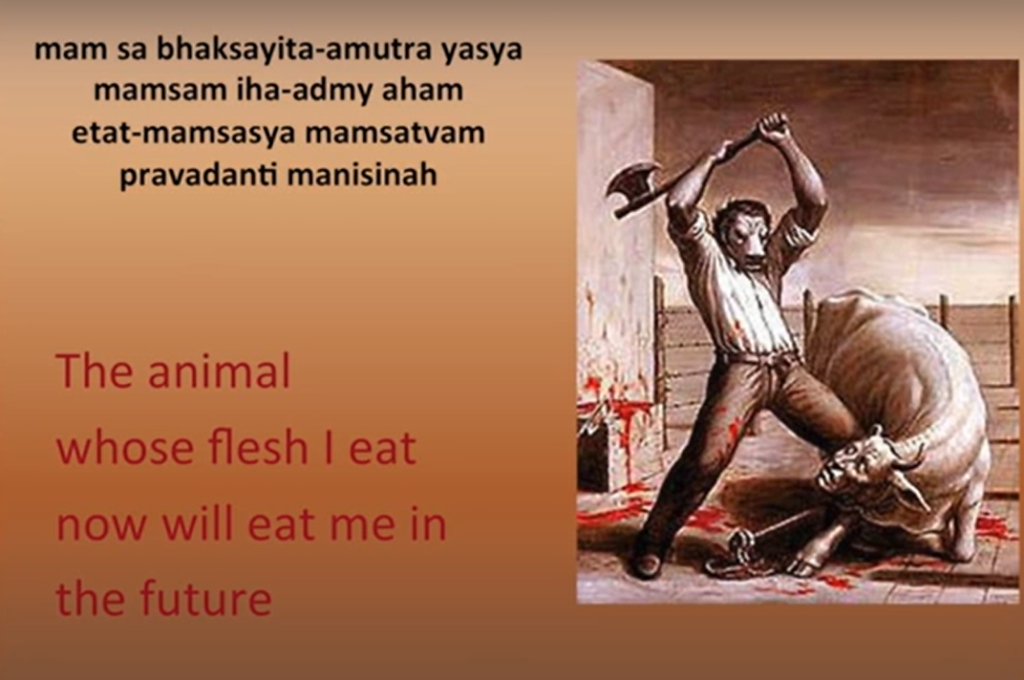
So according to our sinful activity, we will get a certain result. This is of course also in the Bhagavad Gita. I think you act like a tiger and you eat a lot of meat and things like this, you can become a tiger. That’s your bad karma. You like to sleep like a bear, then you become a bear. So according to our activities, we get some result in a future lifetime.
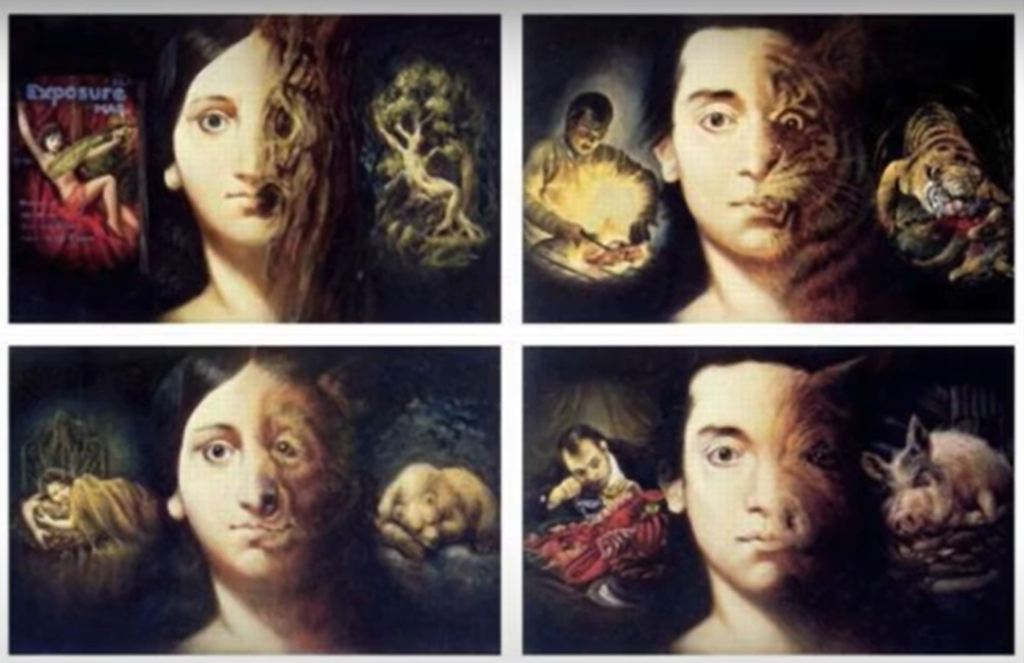
So unlike the government, you get rewards also, you get special rewards by doing punyas. So you get very, very nice result in future lifetimes. You may get a lot of money, get a good family, good education, don’t have to work too hard, a long lifespan, good health. These are all results of good karma. So I said that by experiencing these reactions, we finish them. By experiencing the suffering, we finish that particular bad karma. By experiencing the good karma, a nice lifespan, then that’s finished and we’re back to zero again [Laughs].
But not so simple. It doesn’t mean that our karma is eventually going to be exhausted, because we’re always producing new karmas. And in one lifetime, we don’t expend all of our previous karmas. So actually, in this lifetime, we’re going to expend some karmas, but we have a whole backlog of karmas, millions of karmas, which are waiting for future lifetimes also [Laughs]. And we can expend a few in each lifetime. But we’re producing new karmas also. So in this way, we never exhaust the karmas. In spite of the fact we live for so long, many, many births, we expend some, but we create more, we create more, etc. So it’s an endless cycle because of that. So we add new karmas and we expend 5% [Laughs]. We’re always increasing, increasing our balance of karma all the time. So all we can do is alter the balance somehow, and do more good karmas, and do less bad karmas. That way, at least we don’t have to suffer, and we don’t have to regret our lifespan, etc. So in any case, we end up with endless cycle, life after life.
So we’re not aware of this. But if we go to scripture, this is what it will tell us. We have life after life after life. So what we are now is simply the result of endless, infinite births and deaths previously. We are the result of all those karmas. So no beginning and no end. It’s anadi. So though it has no end, as Prabhupada says in Bhagavad Gita, it can have an end. We do a certain type of activity, we can also end it. But it is rare !! Most people don’t do that. They just continue and continue and continue. So as I said, the karma creates circumstances. You’re born in a certain family, in a certain place, at a certain time. That’s a circumstance. And as you grow up, you’re put into certain circumstances. You’re in a certain neighbourhood, for instance, then you change and you go somewhere else, a new neighbourhood, you get certain education, then you get a certain job. So part of this is your circumstance.
However, not everything in your life is determined like this. In other words, we sit here, it happens to us, and we don’t do anything. No. We also put forth endeavour, we also make choices. This also influences our events as well. So it’s a combination. Certain things are fixed, and certain things we can alter a little bit. Like the game of Monopoly. It has some fixed rules. You can’t change the squares and you can’t change the value, they have each value on each one. You can’t change that. So the fixed rules are there. And if you hit that spot, then you have to pay that money or whatever like that. So there’s some fixed rules. But there’s also choice. You can choose to buy the property or not buy the property [Laughs] or you can sell it or whatever you want to do. And so there is choice, and there’s also then freewill, and there’s also certain things which are fixed. And if you’re very intelligent, maybe you could win. You could win the game. So life is like that also.
It’s not just everything is fixed and I sit here doing nothing. We make choices and we can also alter things. We cannot alter completely, but at least we can change things and make it better, or we can make it worse. So it’s a combination of the circumstances of karma and our choice of action in this lifetime that determines our life. So it’s not just fate or, you know, whatever circumstance only. So, therefore the choice of action is also very important in making your life. This example is given also. Just as a chariot cannot run on a single wheel, in the same way karma alone will not accomplish anything without human effort. So we got our karma and then we got our own choices and our effort and what we’re doing in life. The combination will produce our final result. So we got karmas, choice of action. We get results in this lifetime, but that choice of action is going to create new karmas also [Laughs]. So we get results for the next lifetime. That’s a little bit complex.
We could alter the results of this lifetime by our choice of action. By doing that we also get results in next lifetime. So choice of action is very important. If we do actions in tamo gun or the mode of ignorance, we get lower consciousness and greater suffering. And we can even become an animal or a plant by doing tamasic actions. If we do actions in rajo gun, mode of passion, we get low human consciousness and a lot of suffering. So we can be born as a human being, but we get a lot of suffering, a lot of struggle. If we do actions in sattva gun or goodness, we develop pure consciousness and we have peaceful life, better life, comfortable life. In fact we can go upwards and go to other lokas. So we can live for thousands and thousands of years on Svarga Loka or whatever.
So by choice of action we can determine our birth in different lokas, upper worlds, earth or lower species or hellish planets, etc. So we have a choice. Lower worlds, animal, plant, whatever. Dark worlds, hellish planets or whatever. We can be born on earth. Okay, fine. It’s a kind of neutral. It’s got good and bad mixture. And we can get upper worlds, where it’s all very, very subtle, long lifespan, minimum of suffering, etc. So in one section of the Vedas called karma kanda, which is part of the Vedas, it’s authorised, it encourages us to do punyas by which we can go to the upper worlds like Svarga Loka. And we can live a loooong time with peace, enjoyment, happiness, etc. Very, very nice. So this is recommended in one section of the Vedas, karma kanda. In karma yoga, which is similar to karma kanda, this is also encouraged. You do punyas to increase your enjoyment and peaceful life. Okay.
So we have a choice of activities in this lifetime that is governed by our mental states. So mind is very important for the human being. If we look in second chapter of Bhagavad Gita, this is one of the first lessons Krishna teaches. You control the mind. If you don’t control the mind, you degrade yourself. If you control the mind, you can elevate yourself. So what are we going to control the mind? What are we going to aim for in controlling our mind? That we have to determine. But at least we have to begin to understand the power of the mind to determine our future. We don’t control it all, we go down. Bad future [Laughs].
So through the use of the mind, we can transform our karma. So we can change the habits, we can change our desires, we can change our goals. And we can also, by concentration of the mind, achieve our goals. So we can choose goals, and we can realise goals by the power of the mind. That’s how it’s material, but very, very powerful. So we have to learn how to utilise our mind properly. Unfortunately, most people really don’t control their minds. The mind operates according to habits. When children are there, they learn certain things like this, and they develop habits. And those habits continue automatically. So they’ll do certain things every day, get up in the morning, brush your teeth, put your clothes on, go to school. So it becomes automatic. And you can train the mind to do that. Once you train the mind, you don’t think about it too much, and you just continue the same habit. So this is what happens to the mind throughout life. We develop certain habits, certain perceptions of things, certain responses to certain circumstances. And it’s a habit. And we never change it once it’s established. Why? Because it’s easy. We don’t have to think about letting the mind do whatever it wants. Everything happens.
So it’s not random. All these responses or reactions we’re getting to our circumstances are actually programmed within us already. We’ve made a little program. And when that circumstance arises, we react in a certain way. So we don’t have to think about it. It just happens. But it may cause a lot of problems for us also. So if we really want to change, we have to change the program in our mind. We have to alter it. But to do that, it takes work. If you want to change any computer program, you have to go and then you start changing everything around again. So that’s what you have to do with your mind also, to change the program there, to reprogram your mind. And it takes work to do that. Most people don’t have the energy to do that. They just let it continue throughout life if it’s not too disturbing.
But as Krishna says in the Bhagavad Gita, actually you do have to work, and you do have to control the mind, because you do have to set the other goals. So if we’re intelligent, we will make that attempt to control the mind, reprogram the mind. So stimuli come in through our senses into the mind. Certain impressions come in there. Then the mind collects all this information coming in and gives a response. As I said, usually the response is automatic. Immediately it goes in, I like it, or I don’t like it [Laughs]. This is good, this is bad. Automatic response due to our conditioning. It doesn’t have to be like that, but according to how we’ve cultivated our mind and developed a habit. So this forces us to just go along a certain path, and we do not change.
So, what we have to do is change the response !! When all this information is going in, we have to learn how to change how we respond to it. Not react, but respond. How to respond, that’s the whole thing. We have to respond intelligently. So we can act according to our unconscious desires and our programmed responses, etc. Nothing will change in our life for a whole life or we can get the stimuli coming in, and then we can meditate on that, and think, contemplate, what is the best action I should take with all this information coming in? And then we act. So if we can do that, we can actually separate the stimulus from the reaction or response, and think in between. Then we’re on the road to change. We can change our life. We can change the habits, the programming, etc. So in other words, with our vasanas and our karmas, if we don’t make any effort, it’s kind of programmed, and we just go on in the same way throughout our whole life.
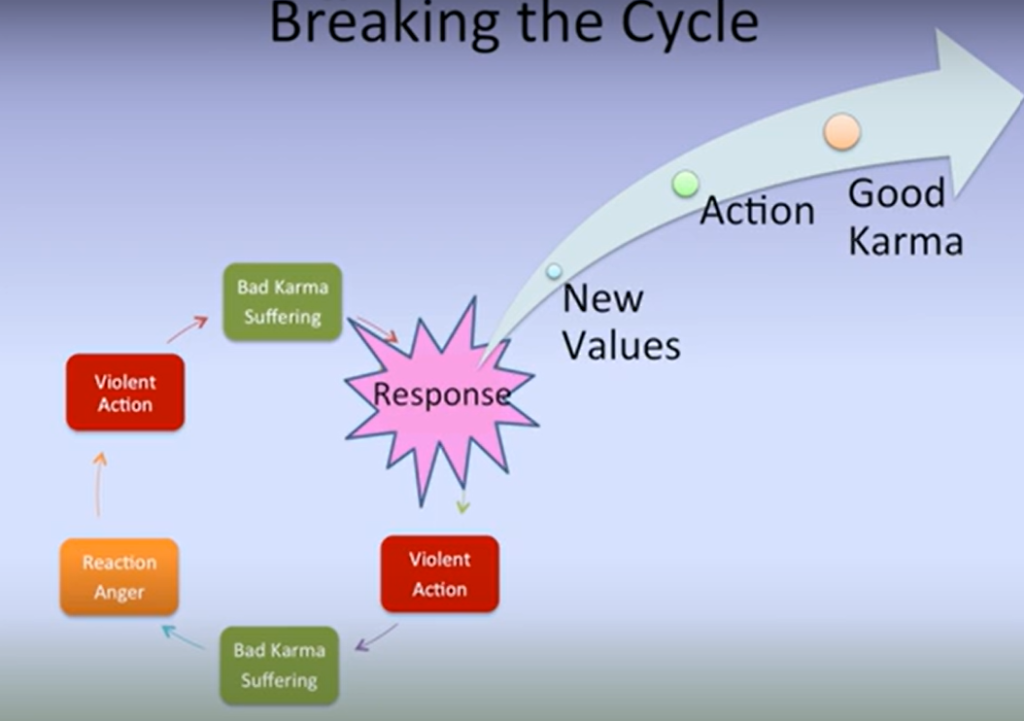
But if we’re intelligent, and we’re a little ambitious in life, and we want to change things, then we can do that by disciplining the mind properly. But of course, we also have to understand what our particular goal is, and base our choices on certain standards that we set in order to get good results. So we should understand that our behaviour is not simply because of our conditions. Most people will blame our environment for how we are. I’m like this because these persons did this. I’m like this because my parents did this. I’m like this because my country is like this. So we blame our conditions. Of course, we have karmic conditions, definitely. But as I said, that doesn’t determine your whole life. We also have our own choices, our own decisions to make. So we should not simply blame circumstance for everything.
So what happens is generally, in our program, in our response to the stimuli, we respond with certain feelings of, I like, I don’t like, which is all our previous experiences of previous vasanas from previous lifetime in this lifetime. Not necessarily rational. So we may have, in some circumstances, a reaction because of a feeling. So we react in a certain way, which is completely contradictory. People will wonder, why are you angry? Why are you so angry [Laughs]? And nobody can understand. But it’s because of feeling. All this information coming in produces a certain feeling, because it reminds you of previous circumstance, like that. So you get the same feeling and the same response. So this is lack of control.
So what we have to do is, replace feelings with proper values. We have certain standards by which we live. And that’s how we determine how we respond to the different stimuli coming in. Not according to feeling, but values. Then we are free. So we have to establish values. So people react because of circumstances and the feelings which are conditioned that they give a response to, like that. And if that’s how we act throughout our life, we can’t change anything. We can’t develop any new goals. If we have any goals, they will fail. These are all the old habits. And if we keep them, nothing happens. We don’t change [Laughs]. So we shouldn’t be reactive. We should be proactive. We should not respond or react to our circumstances. We should carefully choose according to our values. Then we can change everything.
Okay, so there are different types of values. Unfortunately, a lot of values are imposed on us by society, country, family. This is good, this is bad, this is good, this is bad. This is superficial. So the real values have to come from inside, somewhere inside, ultimately from Atma. Not just the mind, but the Atma. Then that’s a basis for change. Internal, profound values, not superficial values from outside. Of course, some of the outside values are not bad, and they can become internalised also. We have many people that have the outside values, and they’ll follow all these outside values if people are looking. And when nobody’s looking, then they’ll break all the rules [Laughs]. That’s what criminals are. They look like they’re following all the rules, but inside they’re doing something else. And then, so that’s superficial. Superficially they follow, but inside they’re very corrupt. And then eventually if nobody’s looking, they’ll break all the rules [Laughs]. So that’s not what we want. The values have to come from inside.
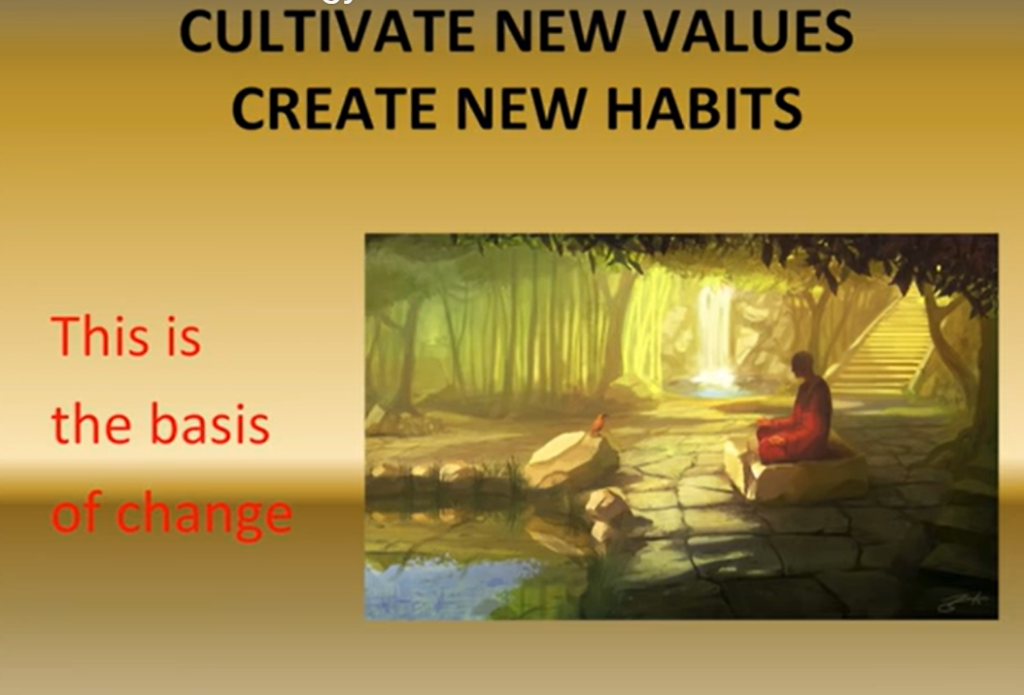
But then what are the values? What are the goals and things that we choose from? So society gives us lots of goals, too many goals. One is get married, which was common up until the present day. Now present day maybe it’s not so common, but up until now most societies had a big emphasis on marriage. You got to get married, you got to get married. Still prominent in India, quite prominent. But somehow some people don’t want to get married also nowadays. But anyways, it’s one of those goals, get married. And of course, have children. Of course, these are emphazised strongly in the Vedas, in the Karma kanda section, Karma Yoga. And we have all these samskaras, glorifying married life, having 10 children, etc. Money-centred. In order to get married and have a family, you have to support it. So you need money. So this is automatically a goal. And this is one of the big goals of society. You have to make money. How do you get money? Job. You have to find a job. How do you get a job? You have to get an education. So all these things are linked together. And then what do you do? You work up very hard, and then you have to buy some things, get possessions, and this is mine. So these are all goals, material goals, of course. And common goals in all societies. And then to relax, we have a lot of pleasure and stuff.
So such goals are not uncommon. They’re around the world, etc. We can’t criticise them. It’s necessary for survival, etc. All these different goals. However, all these goals are to do with the body, ultimately [Laughs]. And scripture tells us, you’re not the body, you are the atma or the soul. So if we neglect the soul, we’re neglecting the major goal of all. So this is the problem we have with all these goals that society and family impose upon us. If we go to scripture, of course, then we’ll find the second chapter of Bhagavad Gita. Krishna makes it very clear. You’re not the body. Don’t get attached to your body. Understand you are atma. Very first teaching of Bhagavad Gita.
So that should be one of our goals. We don’t have to exclude the other goals. But this has to be one of the goals also. To do that, of course, then we have to work on that. We have to change our mind, which has got its own little habits and whatever. And we have to concentrate on this, retrain our mind.
So we have not just atma, but we have many internal goals. We have to understand who we are, actually. What is our real need? What is our real desires? What will satisfy me? What’s my real nature? What are my true qualities? What are the principles by which I live? So these are the goals we have to establish ultimately. It may look a little difficult, but we have to work at it. If we do this and we establish our values and our standards based upon something in turn from atma, it provides power. We can decide our future. It provides wisdom. We can look at the world completely different from everybody else. Everybody else is operating under the law of karma and vasanas, etc. We can look at the world in a completely different way and make our choices based on that guidance. We don’t have to ask other people what to do. Why? Because we have atma, paramatma, and our own principles. So we don’t have to depend on other people. And security. We don’t have to worry anymore, birth and death and all these things, because ultimately we are not the body, we are the atma, which is eternal. So by cultivating internal values inherent in the atma, then we can solve a lot of the problems in this material world.
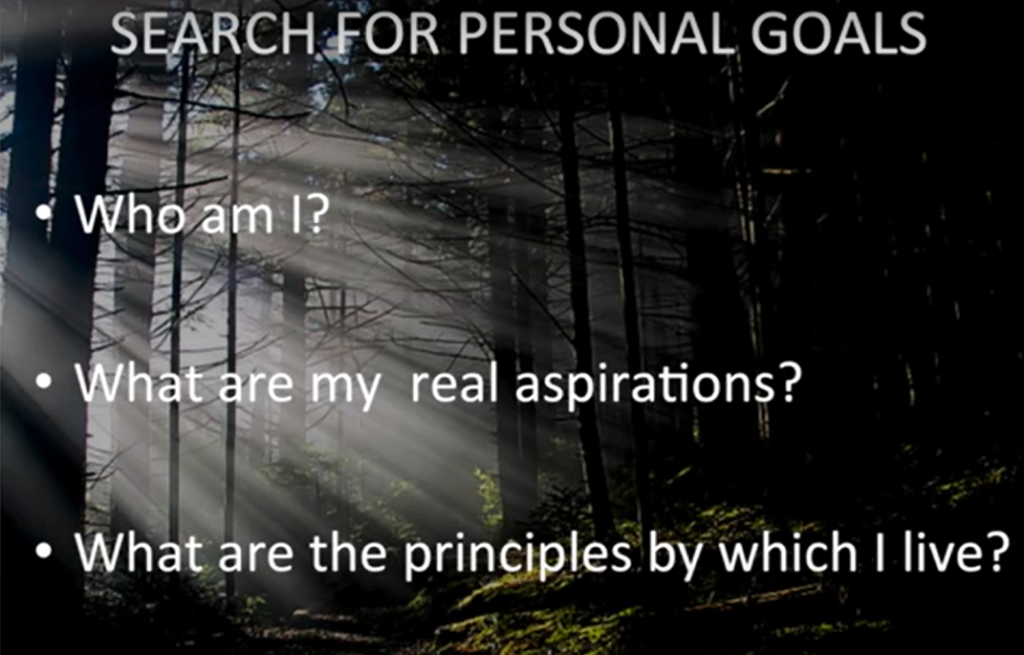
If we have low sense of security, we feel helpless in this world. Everything is affecting me. I can’t do anything. I feel pretty helpless. But if we do have a proper spiritual centre, we can have a high sense of security and be very confident to face any situation in the world. If we have low sense of guidance, then we have to depend on other people to do things and get guidance. If we have high sense of guidance, we have our inner direction. And we’re very peaceful. If we have low sense of wisdom, we have a very distorted vision of the world and how it’s operating. We may think the whole world’s operating on cut throat materialism or whatever, communism or whatever, political things or whatever. If we have accurate, high wisdom, we have a very accurate vision of how this world is operating, understanding the law of karma, free will, etc. If we have a low sense of power, we don’t want to do anything ourselves, let other people do it. And if we have high sense of power, we can fulfil our goals. We can achieve our goals in this lifetime. We can change our future. Very good.
So we should make that spiritual goal one of our primary goals. It may not occupy all of our lives, but it should be there at least, along with our security, our family, job, etc, whatever. So the mind has to be used to decide that. And then the mind is very useful to achieve the goal. We have a goal, fine. But then we have to take some steps to get there to achieve it.
We have to do action. We have to make decisions. So the mind is very important because if you concentrate on the goal, you can achieve it. You have to concentrate on it. When you concentrate on it, then you automatically get some inspiration to see the means by which you can do it. So you have to concentrate. So the mind has to be there to concentrate on the goal like anything. And then finally it manifests.
That power of the mind is illustrated in Bhagavad Gita chapter 8, where Krishna says, whatever state of being one remembers when he quits his present body, in his next life, he will attain that state without fail. Your mind is so powerful, it makes your next body. If you think of something when you die, you become that. Bharat thought of a deer. He became a deer [Laughs]. So that’s of course from one life to another. But in this lifetime also, whatever you think of, you become in this lifetime. So if you have a certain goal, you can achieve it. This of course can be misused. We can think of all sorts of bad material things we want and achieve those things. It kind of works, but not completely perfectly because there are laws also that determine how you get your goals achieved.
So yes, you concentrate on your goal, but there’s also some conditions under which it will be fulfilled nicely. And one of the conditions is no violence, minimum of violence. You have to do it in such a way it benefits everybody, not just benefit yourself. If you benefit yourself, you could achieve it and then it gets destroyed. You get it and you lose it like anything. So we have to concentrate definitely, but in the proper way. Unfortunately, most people don’t concentrate. They may have a goal, can’t concentrate, and therefore they don’t achieve it. So therefore concentration is necessary. And this is of course the lesson that Krishna teaches in the second chapter of Bhagavad Gita. You’ve got to control the mind. You’ve got to concentrate the mind. Like Krishna says, Arjuna says, ah, it’s very difficult. And then Krishna says, what he says, ‘abhyasena tu kaunteya’. You have to practise, continually practise.
Oops, are we going over time? Okay. So, in summary, if we want to change things, don’t expect everybody else to change. We have to change. That’s the first step. If we change, the remarkable thing is people will change. But if we don’t change, nothing’s going to change. So we have to start changing by changing ourself. And it goes not just the mind, not just the intelligence or whatever, education or whatever, but it has to go to the Atma, redirect the Atma. And we have to have that spiritual goal. So, change is possible, but takes effort. That means we have to keep practising. Because we have the bad habits, we have to replace that habit with other habits, etc. So we have to keep drilling the mind and concentrating. So, daily drill the mind to accept new paradigms, new habits, and new goals.
We can change ourself more easily than we can change somebody else. So, you can tell everybody else to change, but it’s not really going to happen. Better change yourself.
By becoming responsible for our decisions and our actions, we change ourself. That is, we should be aware of the law of karma. That is what the karma law is for, to make us responsible. I do this act, I’m going to get a bad result. I do this, I’ll get a good result. And through this, we gain power over our future.
So, we should choose our goals with intelligence, imagination, and do so constantly. The goals must include acting according to internal principles by which we live the values of the soul. So, we should have a scriptural guideline for our goals also. What we cannot change, we accept as Krishna’s mercy. By changing ourself, we change others. We should strive for mutually beneficial benefit rather than gain at others’ expense. So, we have the law of attraction. Mind produces reality. You think of cat, you become cat [Laughs]. You think of deer, you become deer. Think of dog, you become dog. We just were discussing and thinking, oh, why are all the dogs in Sidney. It’s like a mother in the house. They’re part of the family now. So, if you think of your dog too much, you can become a dog. That’s probably one reason why in India, they don’t have dogs in the house, because you’re thinking too much about them and then you may become a dog.
The law of karma. This is a responsibility. Actions produce equal action like that against ourselves. So, you have to be very careful. We avoid the sins. We try to do the punyas. The law of responsibility. Control the mind and then we got the freedom from the law of karma. Once we learn the law of karma, become responsible, we get free of the law of karma. Okay. Law of change. If we change the self, we can change the world. If we don’t change ourselves, nothing happens. So, everybody wants change. It begins with the self and the law of choice. So, we have to set values and according to the values and we make our choices.
But still, we need a little guidance. We’re a little confused. So, there’s some very simple principles to follow. Choice of action. So, we simply have to ask, is it good for the body? In other words, physical health. So, if it’s bad for your health, don’t do it. That’s all. Simple. But even such a simple principle is very difficult for many people to follow. So, we have cigarettes on the packages that says this is injurious to your health. Still, people buy and they’re smoking anyway. They don’t want to have bad health but somehow or other, they still do it. We have to be intelligent enough to take care of our body. So, make choices like that.

On a higher level, we should think of things which are going to bring peace and happiness to our life on the mental level, not things which are going to disturb us and agitate us and keep us in tension, stress all the time. Avoid stress.
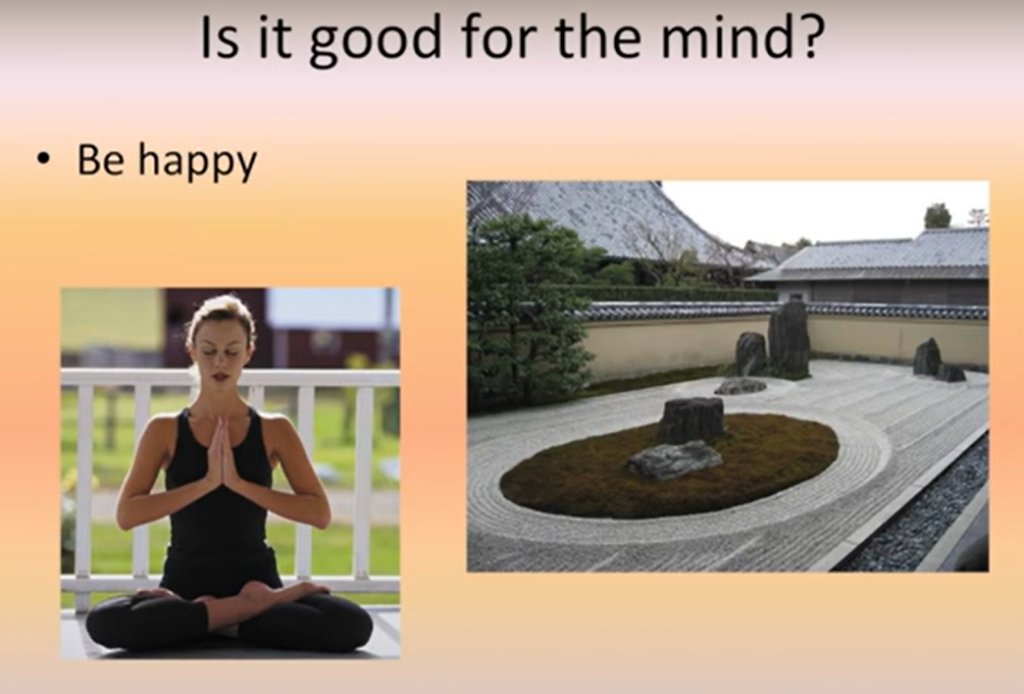
It should be truthful. It’s a moral morality involved here. It should not be full of lying and deceit, whatever we do.
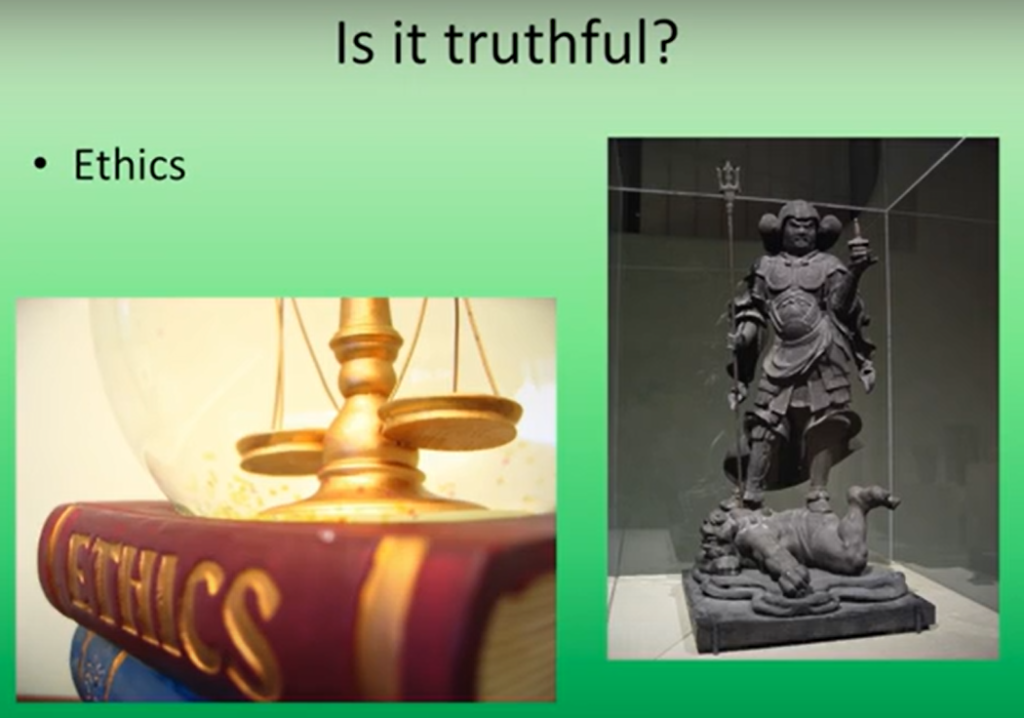
It should bring beauty to the world. It should not create ugliness. So, these are one, two, three, four, five. And for any choice, they should all be positive. If any of them are negative, we don’t do it.
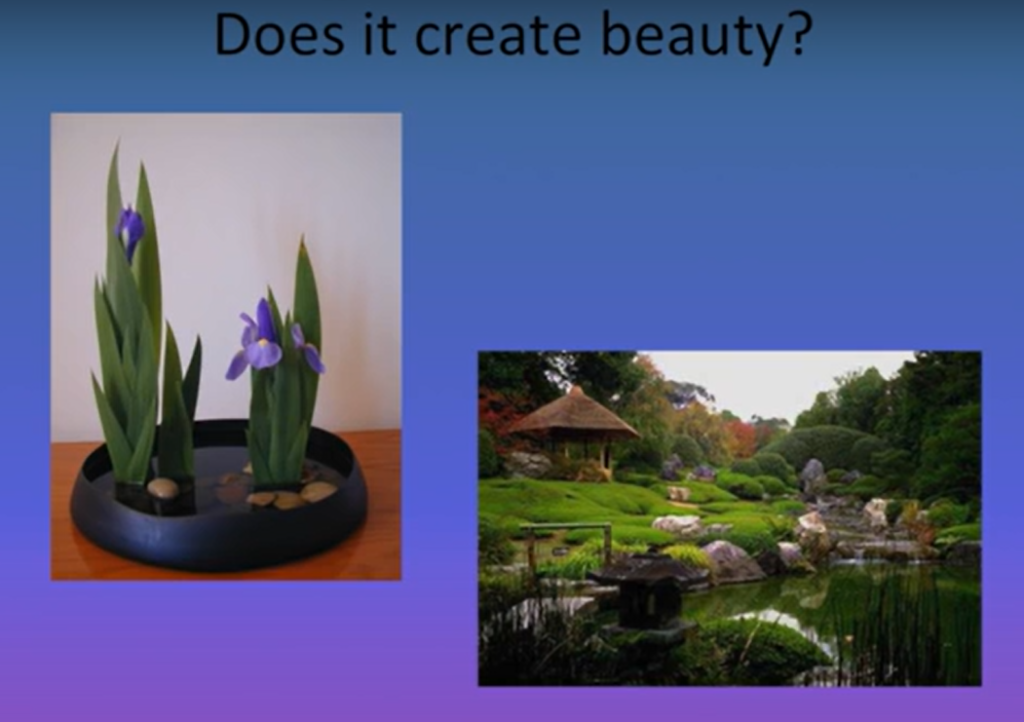
But the most important one is it should produce unconditional love. It should add to our spiritual life.

So, if we get yes for all five, then we do the action. If one of them is no, we don’t do it. Simple principle, but it works. So, that’s a simple way of doing everything. And as a result, we get our spiritual life.
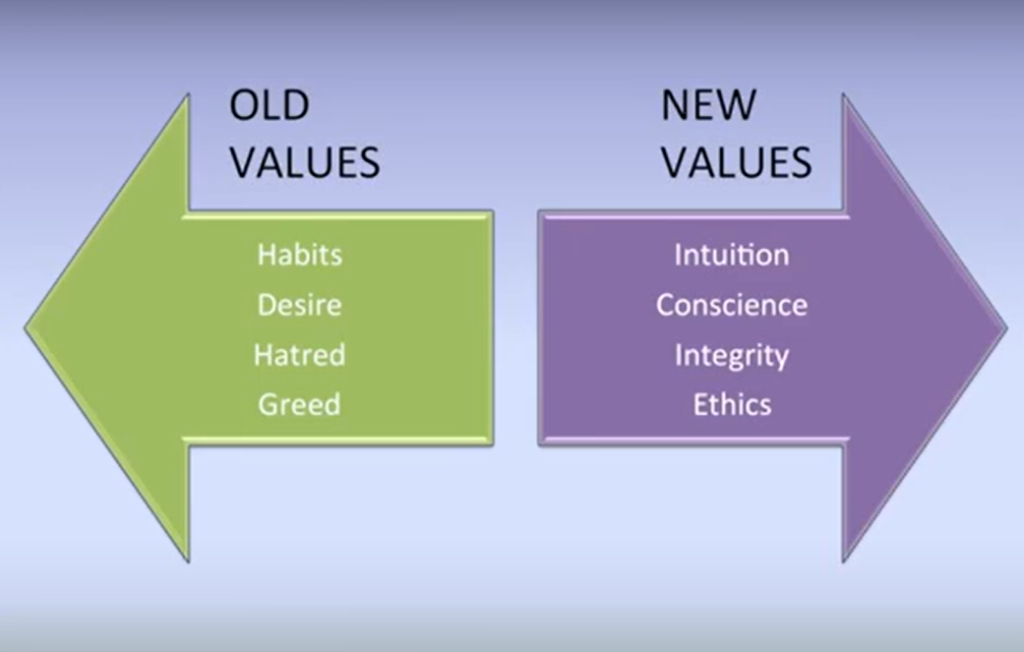
Q & A:
Coordinator Devotee: It is a very big topic, it was wonderfully covered by Maharaj. Now, if there are any questions for you, then there are two mics on each side. So, if you please lift your hand and then we can pass the mic and then ask the question.
1. Hare Krsna Maharaj, Preaching to teenagers is a very difficult task. We are asking and teaching them. Karma always comes back. And somebody is troubling you guys that they are just a ‘nimitta-mātram’. They are just a medium. And Krishna gave a free will to choose what you want to do and everything. And the question asked me by the kid.. So, it means if I trouble somebody, it means their karma come back. I’m just a medium. So, how would I answer that one?
Well, we are individuals, but of course, we’re not alone in the world. So, there’s always other people involved. So, the karma becomes a little more complex because we have not only ourselves, we have other people and there’s constant interaction between them. Nevertheless, the individuals have their own choice and their own responsibility as a human being. So, therefore, we cannot say it’s the other person’s fault or whatever like that. I didn’t do anything. It’s their karma. No, we do have some sense of responsibility ourselves. That is as far as our choice of action is concerned.
However, there’s another condition that this ability to choose and get karma happens when you’re an adult. So, when you’re a child, like in the country also, you commit a crime, you don’t get the same punishment [Laughs]. So, like that, for karma as well, when you have full capacity to judge as an adult, then you’re subject to the law, whatever. And that in the sense of choice of action and getting result for that. Now, of course, still, even as a baby and a child, you are getting the effects of previous activities that you did as an adult in previous lifetimes. So, that’s there. So, we’re born with those effects of karma. And in this lifetime, we are with other people and we’re in the world and various things are going to affect us.
As I said, not everything is determined by karma. We also have choices. Of course, when we’re a child, we don’t have much choice. When we are an adult, we can choose. We can choose where to live. We can choose certain things. And by that, we can alter what happens around us in our environment, etc. But there’s always a play there. But part of it is depending on our choice. So, we can never absolve ourselves of our free will in the matter of our karmas.
2. Hare Krishna Maharaj. I don’t want the bad karma, but let’s say I don’t want a good karma either. I want to exit the game altogether. Is there any chance, any way in this lifetime that I can perform activities on a daily basis?
Okay. Yeah [Laughs]. Yeah. So, as I said, I was just dealing with karma here. So, there are ways of ending the cycle of karma. Most people don’t do that, but it’s there. So, in the Vedic literature, we have three methods. One is jnana yoga, study Vedanta, learn you’re not the body, renounce the world, etc. Second is astanga yoga. We do asanas and pranayama and jnana and concentrate again on atma. We destroy our karma and we can get out of the material world. So, these two processes are there to destroy our karma and get mukti or liberation. No more birth and death. No more subject to the wheel of karma. So, both are there, approved by the Vedas, but rather difficult to do for most people.
So, the scriptures and Bhagavad Gita and Krishna in Bhagavad Gita recommends easiest process of ending all this love karma is bhakti yoga, which means we don’t have to renounce, we don’t have to control the senses and stop the senses, we engage the senses in serving Krishna. And this is the most effective and quickest way to destroy all the karmas and stop the wheel of karma. However, it does something more than stop the wheel of karma. It puts us into the spiritual world and we get something called prema, beyond So, it gives us much more than simply stopping the wheel of karma.
3. Dandavat Pranams Maharaj, We all observe Ekadasi, and when we read the Ekadasi Mahatmayam, it says, if you do this Ekadasi, so many sins are dissolved. Even Brahma hatya (killing a Brahmana) is gone. So, how does it affects our karma ? – our birth and death cycle. And also how about visiting dham, how does that affect our karma ?
So Ekadasi vrata is one type of bhakti. So, you follow a Ekadasi vrata, you can destroy your karmas. So, you can destroy the karma of killing a brahmana or whatever like that. No problem. Visiting the holy dham, that is Vrindavan, Mayapur, Puri, etc, Balaji, whatever. Again, that’s a type of bhakti and destroys the karma. So, all actions of bhakti will destroy karma quite quickly compared to jnana or yoga. Karma yoga does not destroy the karma. It just replaces bad karmas with good karmas [Laughs]. But you stay in the material world. So, any type of bhakti will destroy karmas.
But the most powerful means of destroying karmas is Nama sankirtan, chanting Krishna’s name. That’s the most powerful of all four, destroying all karmas. So, even if you don’t go to the holy dham or even if you didn’t do a Ekadasi or whatever [Laughs], still, you chant the holy name, you can destroy all your karmas.
4. Hare Krsna Maharaj, Dandavat pranams. My question is about mutual benefit rather than gain on others expense. Wonderful. The thing is mutual spiritual benefit, but at someone’s material expense. How does this work? Because, say, the other person who is disadvantaged materially is not aware of the spiritual benefit. How does this work? Because sometimes we have to cheat the other person for their spiritual benefit. Say, for example, when we are chanting and the other person doesn’t want you to chant, so you might say, oh, I’m just watching some TV. So, that’s a lie. And because it’s a spiritual benefit, but materially there is a disadvantage, you can’t spend time together. Sorry, my question is complicated.
Well, of course, the idea of having mutual benefit or win-win situation, this, of course is, we were talking about in terms of karma and destroying or getting better karma, etc. like that. When we come to destroying karma, of course, then process of bhakti is the most effective.
So, when we do the process of bhakti, we have certain rules we follow, and one, of course, we don’t preach to the faithless people [Laughs]. So, if they’re not willing to listen, we don’t talk to them, you have to chant or whatever like that. If they’re not willing to chant, we don’t even discuss it like that. Whatever we may give an excuse, it’s this or that, whatever, that’s up to us. At the same time, we should also not do something which is, of course, injurious to them physically or whatever. So, they should not get any negative results from our actions or whatever. But we do have to make the decision that we don’t preach to faithless people. So, that’s permissible. We don’t have to talk about it.
5. Maharaj, “prakṛiteḥ kriyamāṇāni guṇaiḥ karmāṇi sarvaśhaḥ, ahankāra-vimūḍhātmā kartāham iti manyate “ – (BG-3.27). How do we understand, Maharaj?
Hmm.. Everything is done by prakriti ? Yeah.. [Laughs], If we look at the commentaries of Acharyas, then they say, this is a statement which is not absolutely true [Laughs]. It is a general statement to show the power of material nature and how it influences us. If we look later in the Bhagavad Gita, Krishna explains there are five factors in action. Of course, one is the material world, our senses in the body, etc., in the pranas. But then we do have Jiva and Supreme Lord. So, there are many factors in action, not just prakriti and the gunas of material nature. It is very powerful, definitely. But, as I said here, if we’re a human being and we have intelligence, we can actually overcome that influence by proper choice. So, that’s where the Jiva comes in. If the Jiva makes proper choices, then he gets free of the law of karma, etc.
6. Hare Krishna, Maharaj. One question about free will. So, when we say that we have a free will, but we are also born with certain set of gunas like Satva, Rajo, tamo, and then we have those combinations. So, how do we relate free will with those three gunas? Because we are bound by those three gunas. Our behaviour, our actions are not controlled by them. And it’s really hard to overcome. So, if free will is controlled by that, is it like we actually don’t have a free will? Or how do we correlate these two things?
Yeah. So, to some extent, the gunas influence our choices. And if we’re in Tamo gun, which means ignorance, that means we make wrong choices all the time [Laughs]. So, in other words, we’re pretty helpless in Tamo gun as a human being. If we’re in Rajo gun, it’s a little bit of a mixture. We get more intelligence, but still we’re largely affected by mode of passion in our actions. So, we can make some choices, but not all good choices. If we’re in Sattva gun, we can make very good choices because the mind is clear, we’re detached from the material world, and we’re beginning to understand we’re not the body, we are Atma. And we also accept scripture. So, a person in Sattva gun has a very good opportunity to use his free will properly.
However, if you’re a human being, whether you’re in Sattva gun or Rajo gun or Tamo gun, still you have to get karma [Laughs]. You’re responsible for your actions. But if you’re in Tamo gun, you get less reaction. So, that’s like the government. You know, if you’re a child, you don’t get so much effect. So, if you’re Tamo gun, you don’t get so much. If you kill an animal, you don’t get such bad effect. If you’re in Sattva gun, you get terrible effect, because you should know. So, the law of karmas kinds of adjusted for different peoples.
So, we have the Varanashram system, where we have the Varnas – Brahmanas, Kshatriyas, Vaishyas, and Sudras. Sudras are Tamo gun. Brahmanas are Sattva gun. Kshatriyas are Rajo gun, Sattva gun. And Vaishyas are Rajo gun, Tamo gun. So, the mixture. And they all have different laws. And they’re all affected differently by the law of karma because of that. So, the Sudras are a little freer. The Brahmanas are very strict. They have a lot of rules to follow. So, to help out the people in Tamo gun and Rajo gun, there’s a system there. And the rules are simply imposed. You don’t have to think too much. Just do this, do this, do this, do this. And then you follow and you progress. You avoid the sins and you progress as a Sudra or as a Vaishya or Kshatriya or whatever.
So, we have a system of rules. The more you go up, the more freedom of choice you get. The more Tamo gun you are, the less good choices you’re going to make. So, therefore, choices are made for you instead [Laughs]. You don’t get any money to waste or whatever like that. So, that’s the system in the Varnashram to help the people in the lower gun gradually rise up. But nevertheless, as a human being, everybody is subject to karma. But as I said, there’s different results for different levels in the gunas according to their advancement.
7. Hare Krsna Maharaj, Dandavat Pranams. In this fast changing world when dynamic decisions and actions need to be taken, you mentioned that there are five steps to see how you can take an action. But with this fast changing, when you have to take spontaneous decisions, how would you train your mind to be fast enough that you’re not late in terms of taking any action rather than inaction?
Well, I guess it’s training. Just like if you are a Kshatriya and a fighter, you have to make instantaneous decisions about something [Laughs]. Otherwise, you get killed or whatever like that [Laughs]. So, it’s just a matter of training, how you train your mind to make decisions.
And of course, the real Kshatriya, he’ll make a proper decision at that time with all these different factors. Is it good for the Brahmana? Is it good for the Kshatriya? Is it good for the Vaishya, Sudra? And if there’s a mixture, then what are we going to do? What’s the best advantage we can give for the best people or whatever? So, he has to consider all of these things. Just like a king, he has to consider all the different options and come up with the best solution. So, of course, it may be difficult in some situations, but if we train ourselves enough, then we can make some good decisions.
Coordinator Devotee: Sorry, this will be the last question. I know there are a lot of questions, but we have to finish the session. Okay. So, one last question.
8. Hare Krishna Maharaj, thank you for a wonderful lecture. I’m not able to understand the transition from your one of the last few slides. There was something regarding we should make like good choice that should be good for our physical body and like mental happiness. And there was suddenly like unconditional love, spiritual. I just wanted to understand, to elaborate on that and the transition from that to the unconditional love and if it’s possible for us in this life.
Yeah. So, the last point was unconditional love, which we mean bhakti yoga. So, which is spiritual life. So, we have these factors, your body, your mind, morality, whatever, fine. But we also have to consider the atma, the soul, what’s good for the soul, spiritual life [Laughs]. So, that’s the idea of unconditional love there. So, when we make choices, we don’t have to just consider our body, what’s good for the body or the family, we have to say what’s good for spiritual life of me and my family also.
Coordinator Devotee: Thank you very much, Maharaj. So, let’s all chant one time Hare Krishna mantra for Maharaj.
Devotees:
Hare Krishna Hare Krishna Krishna Krishna Hare Hare
Hare Rama Hare Rama Rama Rama Hare Hare


